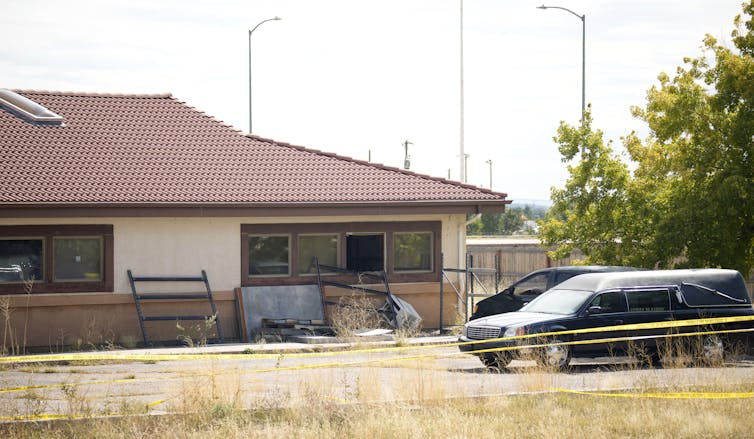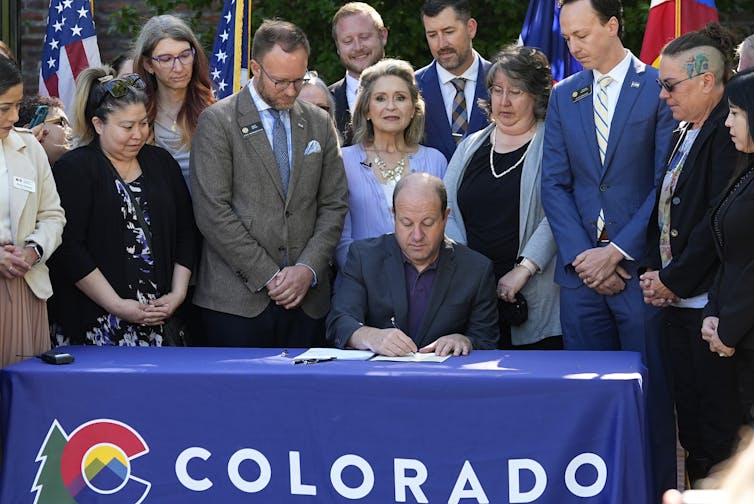In May 2024, Colorado enacted two laws that will tighten regulations on the funeral industry. The legislation comes in the wake of several incidents at funeral homes across the state in which human remains were mishandled and, in some cases, family members received fake ashes of loved ones.
The Conversation U.S. spoke with Tanya D. Marsh, a professor at Wake Forest University who teaches the nation’s only course on funeral and cemetery law, to better understand whether the new Colorado legislation will prevent future funeral home scandals.
Can you describe the scandals?
In the past couple of years, Colorado has had two major funeral home scandals.
In 2023, the operators of the Sunset Mesa Funeral Home in Montrose, Colorado, pleaded guilty to federal criminal charges. They admitted that they lied to hundreds of families from 2010 to 2018, promising to cremate their loved ones but instead selling their bodies to so-called body brokers. Body brokers operate in a gray area of the law and provide donated human remains to universities and companies engaged in medical and scientific research.
Megan Hess, 46, was sentenced to 20 years in prison, and Shirley Koch, 69, was sentenced to 15 years in prison.
In early 2024, the owners of Return to Nature Funeral Home in Penrose, Colorado, were charged with mishandling the remains of nearly 200 individuals. They have been charged in state court with the crimes of abuse of a corpse, money laundering, theft and forgery. Owners Jon and Carie Hallford claimed to sell cremation services. Instead, they allegedly stored the remains in the funeral home without refrigeration and returned dry concrete powder to the families in place of ashes. Court documents say the bodies were stored “in rooms infested by bugs and the liquid decomposition of other bodies.”

The thing I find striking about both scandals is how long the misconduct persisted before they were discovered – eight years in the Sunset Mesa case and five years in the Return to Nature case. Colorado law didn’t require inspections of funeral homes, and it is certainly possible that regular inspections would have uncovered both of these situations much earlier, potentially sparing hundreds of families from exploitation.
Is this an issue nationwide?
Funeral law in the United States is regulated by states, not the federal government.
The funeral industry has been largely regulated by a system of occupational licensing since the late 1800s. In 2023, every state but Colorado licensed funeral directors and embalmers. Occupational licensing statutes typically require specific coursework – typically an associate’s degree in mortuary science – as well as passing a state or national exam and serving as an intern for a period of time. The vast majority of states also license funeral homes and crematories.
In Colorado, funeral directors and embalmers were regulated by occupational licensing until 1983. That year, the Colorado Legislature replaced that structure with so-called “title protection” for mortuary science practitioner, funeral director, embalmer and cremationist.
Basically, in order to use one of those protected titles in Colorado, an individual had to meet certain requirements that were very similar to the education and experience requirements in other states. Funeral homes and crematories are required to be registered in Colorado, which is similar to licensing.
Although Colorado’s title protection and registration structure was similar to the occupational licensing system used in other states, Colorado had no power to inspect funeral homes, even following consumer complaints. For example, according to court documents, the Fremont County coroner emailed Colorado’s Department of Regulatory Agencies to report his suspicions about the Return to Nature funeral home in 2020, but the state never responded. Essentially, the only enforcement mechanism in Colorado law was criminal law, which can address only the most outrageous situations. For example, in Colorado it is illegal to willfully mutilate or destroy human remains with intent to impair their appearance or availability in an official proceeding such as a criminal trial. Colorado also has an abuse of corpse law that forbids treating human remains in a way that would “outrage normal family sensibilities.”
How will the legislation work?
Colorado recently enacted two measures designed to improve the regulation of funeral homes. The first measure, signed by Gov. Jared Polis on May 24, 2024, requires the routine inspections of funeral homes and crematories. The state initially anticipates hiring two inspectors to cover the state’s more than 300 listed funeral homes, but a recommended schedule for their work hasn’t yet been released.
The second measure was signed by Polis on May 28, 2024. It essentially converts the title protection requirements in effect since 1983 into a more standard occupational licensing regimen. Current Colorado practitioners who lack the required experience or education have three years to become licensed.

Will this prevent future scandals?
Clearly, the sponsors of the legislation hope that it will protect consumers and prevent the kinds of scandals that Colorado has recently experienced.
In my view, the most significant part of the new legislation is the requirement that funeral homes and crematories will be routinely inspected. Inspectors would have likely discovered the bodies stored at the Return to Nature Funeral Home much earlier. It isn’t clear, however, that inspection would have discovered the activities at the Sunset Mesa Funeral Home.
I’m not sure that the new licensing requirements will be a silver bullet. Jon Hallford came from a multigenerational funeral family and had a mortuary science degree. Unfortunately, education and experience don’t always mean that a person will behave in an ethical and legal manner.
Finding a reputable funeral home can be challenging for consumers, since people need their services only infrequently. That challenge is more difficult when you are making decisions only at the time of loss, when you are grieving and under stress. The best strategy is to research options and funeral providers in advance and plan as much as possible. Cultural unwillingness to talk about death and death care makes it more difficult to spot and avoid the bad actors.

